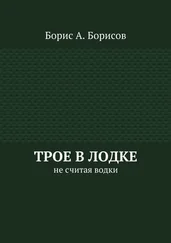Three Invalids. — Sufferings of George and Harris. — A victim to one hundred and seven fatal maladies. — Useful prescriptions. — Cure for liver complaint in children. — We agree that we are overworked, and need rest. — A week on the rolling deep? — George suggests the river. — Montmorency lodges an objection. — Original motion carried by majority of three to one.
HERE were four of us (нас было четверо: «здесь было четверо из нас») — George, and William Samuel Harris, and myself, and Montmorency (Джордж, Уильям Сэмюэль Гаррис, я /сам/ и Монморенси) . We were sitting in my room, smoking, and talking about how bad we were (мы сидели в моей комнате, курили и говорили о /том/, как мы плохи) — bad from a medical point of view I mean, of course (плохи с медицинской точки зрения, я имею в виду, конечно; to mean — иметь в виду, подразумевать) .
maladies ['m&l@dIz] suggests [s@'dZests] majority [m@'dZOrItI] view [vju:]
HERE were four of us — George, and William Samuel Harris, and myself, and Montmorency. We were sitting in my room, smoking, and talking about how bad we were — bad from a medical point of view I mean, of course.
We were all feeling seedy (мы все чувствовали себя неважно; to feel — чувствовать, ощущать, испытывать /тоску, боль и т.д./; seedy — потрепанный; нездоровый, слабый) , and we were getting quite nervous about it (и становились довольно нервными = начинали волноваться из-за этого; nervous — нервный, беспокоящийся, взволнованный) . Harris said he felt such extraordinary fits of giddiness come over him at times (Гаррис сказал, /что/ испытывает такие необычайные приступы головокружения, охватывающие его временами; to say; fit — припадок, приступ; to come over — охватывать, овладевать) , that he hardly knew what he was doing (что он едва понимает, что делает; to know — знать; понимать, осознавать; to know-knew-known) ; and then George said that he had fits of giddiness too, and hardly knew what he was doing (затем Джордж сказал, что у него тоже /бывают/ приступы головокружения, и он /тоже тогда/ едва осознает, что делает) . With me, it was my liver that was out of order (что касается меня, /то/ у меня не в порядке была печень; out of order — неисправный, не в порядке; order — порядок; исправность; хорошее физическое состояние) . I knew it was my liver that was out of order (я знал, /что/ моя печень не в порядке) , because I had just been reading a patent liver-pill circular (потому что я недавно читал рекламный проспект о запатентованной пилюле от /болезней/ печени; just — только что, прямо; как раз) , in which were detailed the various symptoms by which a man could tell when his liver was out of order (в котором были подробно описаны различные симптомы, по которым человек может определить, что его печень не в порядке; to detail — подробно описывать, излагать; to tell — говорить, рассказывать; осознавать, понимать) . I had them all (у меня были они все) .
It is a most extraordinary thing, but I never read a patent medicine advertisement (это самая удивительная вещь = поразительно, но я никогда не читаю /рекламное/ объявление о каком-нибудь запатентованном лекарстве) without being impelled to the conclusion (без /того, чтобы/ быть склоненным к заключению = чтобы не сделать вывод; to impel — побуждать, заставлять) that I am suffering from the particular disease therein dealt with in its most virulent form (что я страдаю от конкретной болезни, в нем описываемой, в самой злокачественной форме; therein — здесь, в этом, в том; to deal with — иметь дело с, касаться; virulent — опасный, страшный, смертельный /о болезни, яде/) . The diagnosis seems in every case to correspond exactly with all the sensations that I have ever felt (кажется, диагноз в каждом случае точно совпадает со всеми ощущениями, которые я испытываю; to correspond — соответствовать, соотноситься; ever — всегда, постоянно, вечно; когда-либо; to feel) .
nervous ['n@:v@s] medicine ['medsIn] disease [dI'zi:z] virulent ['vIrul@nt] diagnosis [,daI@g'n@usIs]
We were all feeling seedy, and we were getting quite nervous about it. Harris said he felt such extraordinary fits of giddiness come over him at times, that he hardly knew what he was doing; and then George said that he had fits of giddiness too, and hardly knew what he was doing. With me, it was my liver that was out of order. I knew it was my liver that was out of order, because I had just been reading a patent liver-pill circular, in which were detailed the various symptoms by which a man could tell when his liver was out of order. I had them all.
It is a most extraordinary thing, but I never read a patent medicine advertisement without being impelled to the conclusion that I am suffering from the particular disease therein dealt with in its most virulent form. The diagnosis seems in every case to correspond exactly with all the sensations that I have ever felt.
I remember going to the British Museum one day (помню, /как/ я отправился в Британский музей однажды) to read up the treatment for some slight ailment of which I had a touch (почитать о лечении какой-то легкой болезни, которой я захворал; to read up — специально изучать, читать дополнительный материал; slight — легкий, незначительный; touch — прикосновение, касание; легкий приступ /болезни/) — hay fever, I fancy it was (полагаю, это была сенная лихорадка; to fancy — воображать, представлять себе; считать, полагать) . I got down the book, and read all I came to read (я взял /нужную/ книгу и прочитал все, /что/ я пришел прочитать = что искал; to get down — снимать /с полки и т.д./; to read [ri:d]-read [red]-read [red]; to come-came-come) ; and then, in an unthinking moment, I idly turned the leaves (потом, задумавшись: «в бездумный момент», я лениво перевернул /несколько/ страниц; leaf — лист, страница) , and began to indolently study diseases, generally (и начал без интереса изучать различные болезни; to begin-began-begun; indolent — ленивый, вялый; праздный; generally — в целом, вообще) . I forget which was the first distemper I plunged into (я забыл, какой была = как называлась первая болезнь, /на которую/ я наткнулся; distemper — хандра, дурное расположение духа; to plunge into — ввергать, бросаться, погружаться в) — some fearful, devastating scourge, I know (какой-то страшный, изнуряющий бич, /как/ я понимаю; to devastate — истощать, опустошать; scourge — бич, бедствие, кара) — and, before I had glanced half down the list of "premonitory symptoms" (и прежде, /чем/ я просмотрел наполовину список «ранних симптомов»; premonitory — предваряющий, предостерегающий) , it was borne in upon me that I had fairly got it (я понял, что точно как следует подцепил /эту болезнь/; to be borne in upon somebody — становиться ясным, доходить до кого-либо; fairly — должным образом; четко, явно, ясно; to get — получить; заразиться) .
Читать дальше










